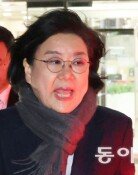Ruling Party Defeated in Re- and By-Elections; Its Political Leadership Under Threat
Ruling Party Defeated in Re- and By-Elections; Its Political Leadership Under Threat
Posted May. 01, 2005 23:36,
The Uri Party recorded its worst-ever defeat in the April 30 re- and by-elections, losing all 23 regions in which it applied for public nominations to, including lawmakers (six regions), local administrators (seven regions), and councilors of provincial governments (10 regions). It is the first time that the ruling party has been completely defeated in the re-and by-elections for lawmakers and local mayors, not producing a winner in a single region.
The Grand National Party won the re-election for lawmakers in five regions out of six regions. In the re-election in Gongju and Yeongi region, in which a new administrative complex city is planned, an independent candidate, Jeong Jin-seok, won the election. Jeong received support from Sim Dae-pyeong, the governor of Chungnam Province, who is planning to form a new political party in the middle part of the country (Chungcheong Province).
The Uri Party, which won 152 seats, the majority of seats in the National Assembly, in the last general election, failed to retain the majority, holding 146 seats after the April 30 elections. The Grand National Party increased its seats from 121 to 125, the Korean Democratic Labor Party secured 10 seats, the Millennium Democratic Party garnered nine seats, the United Liberal Democrats won three seats, and independent candidates won six seats.
The result created a smaller ruling party and bigger opposition party in the political landscape, resulting in potential damage to the exercise of the ruling partys political leadership.
Consequently, it is forecasted that the Uri Party will lean toward the claim that after clarifying responsibility for the defeat, the leadership should be empowered for the local election next year. Also, claims of unification talks with the Millennium Democratic Party, which confirmed its popularity in Honam region by winning an election for Mokpo Mayor in Jeonnam region, appear to be accelerating.
Jeon Byeong-hyun, the spokesman of the Uri Party, said on May 1 after a meeting on measures against their defeat in the re- and by-elections that although the leadership considered resigning from the party, they decided to put their powers to work in reforming the party rather than doing so.
In the election for local administrator, the Grand National Party won in five regions, including the mayoral race of Hwaseong City, Gyeonggi Province, the mayoral races of Gyeongsan, and Yeongcheon Cities, Gyeonbuk Province, a county headman position in Yeongdeok County, and district leader position in Gangseo-gu, Busan.
The Millennium Democratic Party won the election for a mayor of Mokpo, and an independent candidate was elected as a county headman of Cheongdo County, Gyeongbuk Province.
In the election for councilors of provincial governments, the Grand National Party won in eight regions, together with two regions (one Gyeongsan, two Yeongdeok, Gyeongbuk Province) that were elected without voting, and the Millennium Democratic Party and an independent candidate won the election in one region.
The National Election Commission announced on May 1 that a total of 728,731 people out of about 2.16 million voters voted in the elections, resulting in a 33.6 percent voting rate. The rate is 4.1 percent higher than the turnout in April 2003 (29.5 percent).
The average voting rate in six regions where the re-election for lawmakers was held was 36.4 percent, and in the closest region in the election, Yeongcheon, Gyeongbuk Province, recorded the highest voter turnout rate, 59.1 percent.
Yeon-Wook Jung jyw11@donga.com




![“한동훈, 정치생명 걸고 무소속 출마해 평가받는 것 고려할만”[정치를 부탁해]](https://dimg.donga.com/c/138/175/90/1/wps/NEWS/IMAGE/2026/01/19/133186982.1.jpg)


